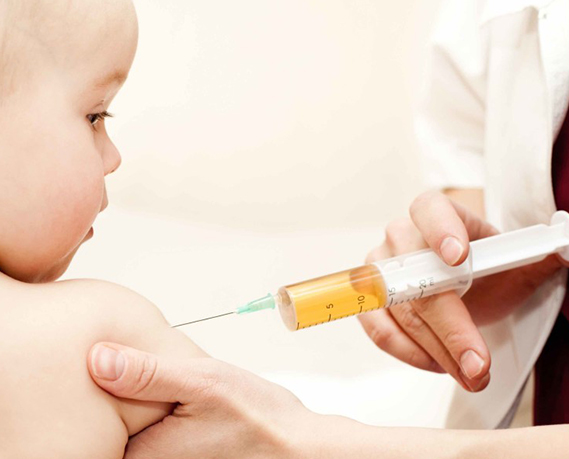
Vaccinations (Children and Adults)

A vaccine is a biological preparation that improves immunity to a particular disease. A vaccine typically contains an agent that resembles a disease-causing microorganism, and is often made from weakened or killed forms of the microbe, its toxins or one of its surface proteins. The agent stimulates the body's immune system to recognize the agent as foreign, destroy it, and "remember" it, so that the immune system can more easily recognize and destroy any of these microorganisms that it later encounters.
The Immunizations Program promotes and protects the public's health through the reduction and eventual elimination of vaccine-preventable diseases by providing vaccine administration, education on receiving timely immunizations, surveillance, and monitoring.
Nawinna Medicare Hospitals Vaccinations Clinic runs a vaccination program that is on par with the National Vaccination Program. Be assured of the safety of yourself and that of your child through immunization against life-threatening diseases. Our Clinic is staffed with experienced medical and nursing teams who understand your fears and concerns.
What do we immunize against?
Our childhood vaccinations include:
- Hepatitis B
- Diphtheria, Tetanus and Whooping Cough (Pertussis)
- Polio
- Hib (Haemophilus influenzae Type b)
- Childhood Pneumonia
- Measles, Mumps and Rubella
- Meningococcal Meningitis
- Chicken Pox (Varicella)
Who needs immunizations?
- Children and newborns: Childhood immunizations are recommended from birth through 18 months, with other vaccinations possible up to 18 years of age.
- Adolescents: Vaccinations targeted specifically to adolescents and teenagers include those against meningococcal disease and HPV.
- College Students: Certain vaccines are specifically recommended for young adult ages 19 through 26.
- Adults: Adults need periodic booster shots and immunization against diseases such as hepatitis.
- Travelers
Vaccinations of newborn and adults
|
Vaccine |
Age to be given |
Prevents |
|
BCG Vaccine |
At birth |
Tuberculosis |
|
Triple Vaccine |
2 months |
Diptheria/Tetanus/Whooping Cough |
|
Triple/Polio Vaccine |
2/4/6 month periods (again this vaccine is administered in 1 1/2 yrs) |
Diptheria/Tetanus/Whooping Cough and Polio |
|
MMR Vaccine |
9 months |
Measles, Mumps and Rubella |
|
Japanese Encephalitis Vaccine |
Over 1 yr (Boosters are given after 1 yr and 2nd) |
Japanese Encephalitis |
|
Measles and Rubella Vaccine |
3 yrs |
Measles and Rubella |
|
Dual Polio Vaccine |
5 yrs |
Polio |
|
Hepatitis A, B Vaccine (there are separate vaccines for both A and B as well) |
With in the 1st yr for babies and there are adults dosages as well |
Hepatitis A+B |
|
Hib Vaccine |
1st yr of baby (optional) |
Haemophyllus Influenza type B |
|
Rubella Vaccine |
For women during child bearing period |
Rubella |
|
Anti Rabies Vaccine |
Following exposure also,(5 doses) can be given in 3 doses prior to exposure |
Rabies |
|
Chicken Pox Vaccine |
Over 1 yr and for over 16 in 2 doses |
Chicken Pox |
|
Meningicoccal Vaccine |
Adults |
Meningitis |
|
Tetanus Toxiod Vaccine |
At exposure or prevention |
Tetunus |
Why vaccines given at such an early age ?
Vaccines are given at an early age because the diseases they prevent can strike at an early age. Some diseases are far more serious or common among infants or young children. For example, up to 60% of severe disease caused by Haemophilusinfluenzae type b occurs in children under 12 months of age.
What id child misses a doze of vaccine ?
They can continue the series where they left off. Vaccinations are not rendered invalid and do not have to be repeated when there is a longer-than-recommended interval between doses in a series.
How safe a vaccine ?
They are very safe. But like any medicine, they are not perfect. They can cause reactions. Usually these are mild, like a sore arm or slightfever. Serious reactions are very uncommon. We will discuss the risks with you before your child gets each vaccine. The important thing to remember is that vaccines are much safer than the diseases they prevent.
Do vaccine always work ?
Vaccines work most of the time, but not always. Most childhood vaccinations work between 90% and 100% of the time. Sometimes, though, a child may not respond to certain vaccines, for reasons that aren’t entirely understood.
What will happen if child doesn't get his vaccination ?
One of two things could happen:
- If your child goes through life without ever being exposed to any of these diseases, nothing will happen.
- If your child is exposed to one of these diseases, there is a good chance he will get it. What happens then depends on the child and the disease. Most likely he would get ill and have to stay in bed for a few days up to 1–2 weeks. But he could also get very sick and have to go to the hospital. At the very worst, he could die. In addition, he could also spread the disease to other children or adults who are not immune.
Which vaccinations are compulsory and why?
Unfortunately, many serious and potentially dangerous diseases are still present in today's world.
For many of these diseases, prevention is better than the cure and the vaccine is the best known way of protecting your baby from them.
The diseases targeted by the government's immunisation programme are:
- tuberculosis
- diphtheria
- pertussis
- polio
- measles
- tetanus
- hepatitis B
- hepatitis A
- typhoid
- mumps
- rubella
- gastroenteritis (rotavirus)
Your baby may need several doses of the same vaccine to protect him effectively against each of these diseases. So it is important to follow your child's immunisation schedule.
Every paediatrician usually gives an immunisation schedule that clearly indicates which vaccines are compulsory, when they should be given and which vaccines are optional.
Some of the optional vaccines are for the following diseases:
- pneumococcus
- chickenpox
- meningococcal meningitis
- influenza